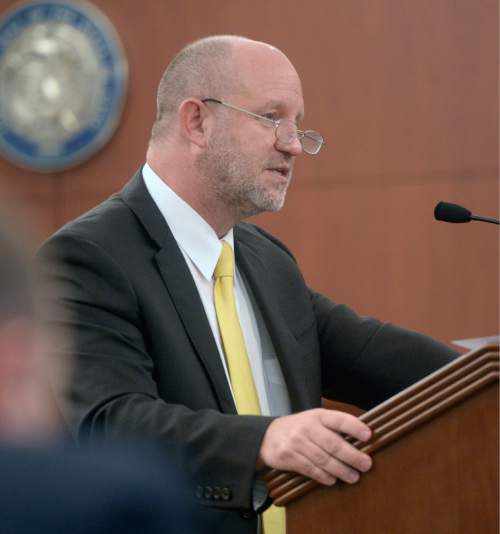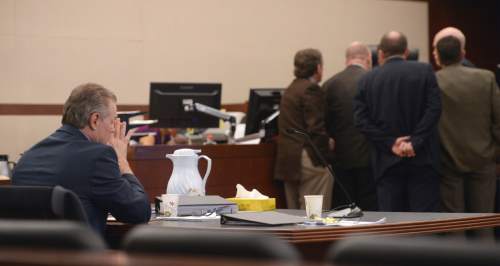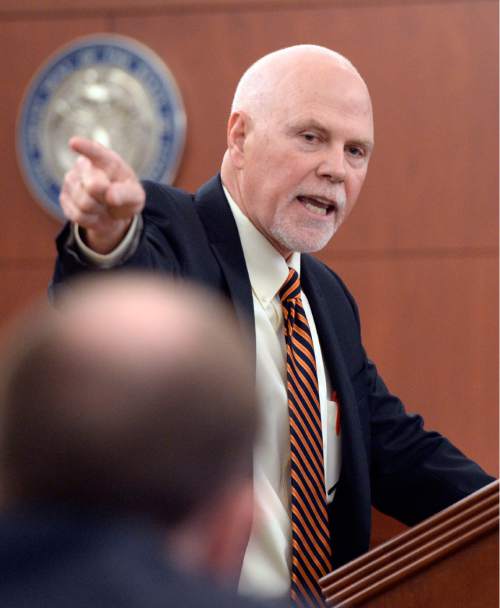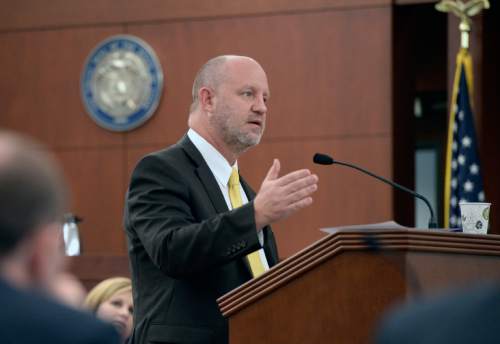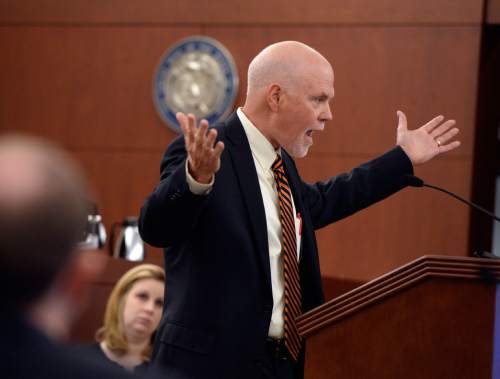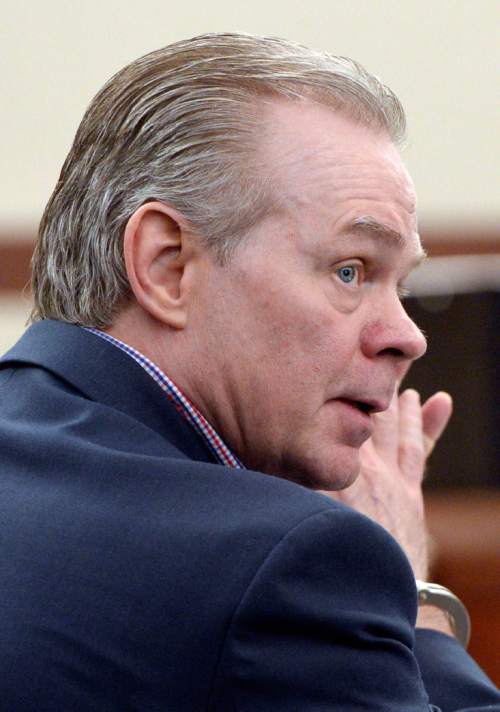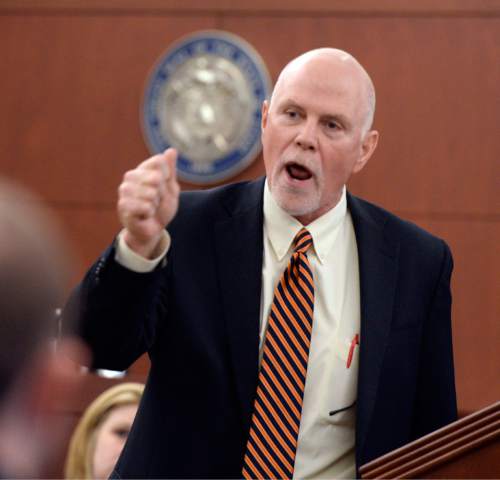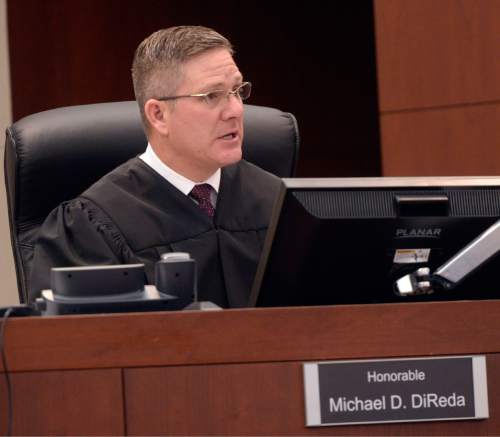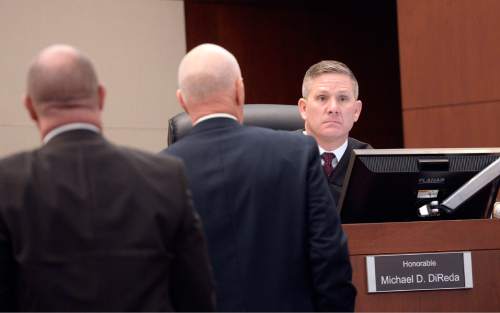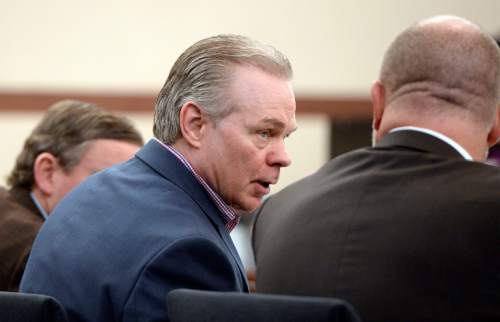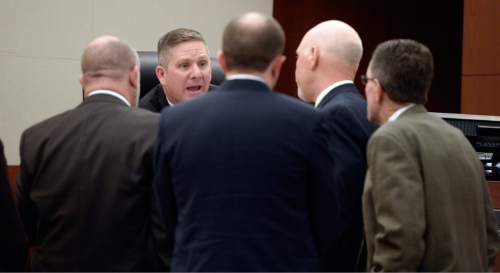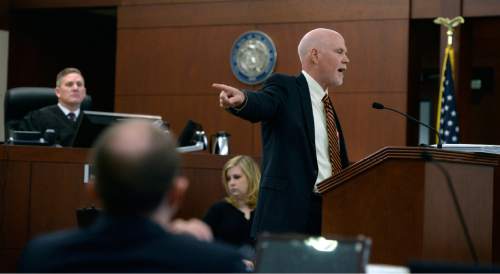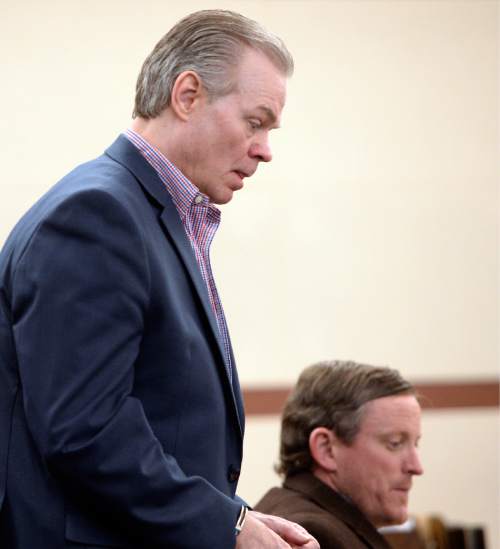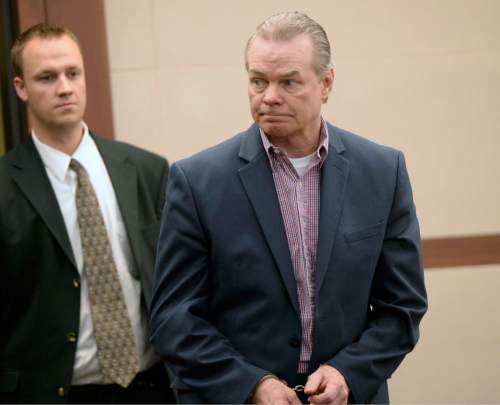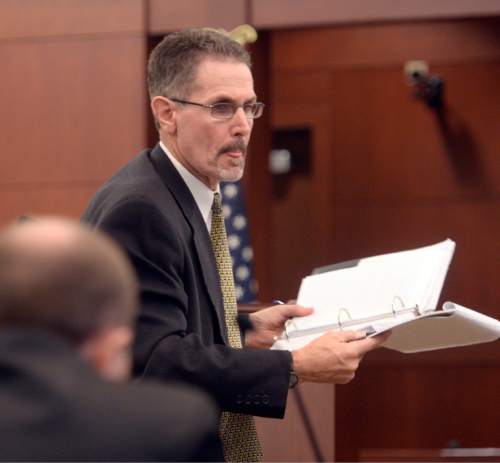This is an archived article that was published on sltrib.com in 2015, and information in the article may be outdated. It is provided only for personal research purposes and may not be reprinted.
Ogden • After deliberating nearly 11 hours over two days, 12 jurors Wednesday determined that Douglas Anderson Lovell should be executed for killing a woman in 1985 to prevent her from testifying against him in a rape case.
Two weeks ago, the same 2nd District Court jury found Lovell, 57, guilty of aggravated murder in Joyce Yost's strangulation death.
For Yost's family, the jury's decision was a relief.
"It's just a very, very good day for Joyce and a good day for our family," son Greg Roberts told news media after the sentence was handed down. "We want to thank the jury for doing the right thing."
Daughter Kim Salazar said that after 30 years, she never thought the day would come that her mother's killer would face trial and be sentenced to execution by a jury.
"It's so hard," Salazar said. "Until you've walked in these shoes, you don't have any idea how difficult it is to get through."
Emotions were high even before the penalty decision was read aloud by Judge Michael DiReda as Yost's family members dabbed tears from their eyes and one juror hung his head and appeared to be crying.
Defense attorney Michael Bouwhuis said Wednesday afternoon that Lovell was "disappointed" in the jury's decision, but added that neither he nor his client believe he actually will ever be executed, given the lengthy appeals process that now begins anew for the 57-year-old prison inmate.
Bouwhuis added that Lovell was on death row for 17 years before the case came back on appeal and was sent to trial. Now it's "a fresh start."
"He was disappointed, but he actually took it pretty well," Bouwhuis said of Lovell. "He indicated that he felt his chances of getting out ever are probably pretty slim. … I think he really hoped that one day he would get out. Now, I think he is probably a little more realistic about that, that it's not very good."
DiReda ordered Lovell put to death by lethal injection May 29, 2015. That order, however, is stayed because of an automatic appeal and review of the case by the Utah Supreme Court.
This is the second time Lovell has been sentenced to death for this murder, which came back to the district court on appeal in 2011.
Yost's children said they are dedicated to continue to push for justice for their mother, even as Lovell's case begins to be appealed all over again.
"I know the path, and I know it well," Salazar said. "I am determined."
In April 1985, Lovell followed Yost, 39, home from a Clearfield restaurant, kidnapping her from her apartment parking lot and sexually assaulting her in the parking lot and at his home.
After she reported the crime to authorities, Lovell began to plot the woman's death to keep her from testifying at his upcoming trial, according to testimony at Lovell's murder trial. He tried twice to hire men to kill the woman — which failed both times — and then decided to do it himself Aug. 10, 1985.
He kidnapped the woman again from her South Ogden apartment and took her to the mountains east of Ogden, where he strangled her and left her body under handfuls of dirt and leaves.
Deputy Weber County Attorney Christopher Shaw told jurors Tuesday during his closing argument that Lovell's crimes against Yost were deserving of death and that he showed "utter and complete disregard" for her life.
Shaw further argued that Lovell threatened the criminal-justice system itself, saying "we devolve to a state of chaos" if society cannot protect victims and witnesses who report crimes against them.
"This very criminal system failed Joyce Yost and failed her miserably," Shaw said Tuesday. "Don't let that happen again."
Bouwhuis argued for a life sentence with the possibility of parole, rather than execution, telling the jury that Lovell has been well-behaved in prison and that his client is a changed man.
"Certainly in 1985, Doug fell to the bottom [of society,]" he told jurors. "No question about it. But he is trying to climb up."
During the past week, the defense team had several witnesses who told jurors that Lovell donates time and money to charitable organizations and that he has been a model prisoner for 30 years.
Two defense experts also testified that Lovell's childhood — during which his mother was depressed and mentally ill and his father was often absent — likely had an effect on the adult he became. The experts also said Lovell was greatly affected by his parents' divorce in his early teens and his brother's drug overdose death when Lovell was 18.
Bouwhuis stressed to jurors that these factors were in no way a defense to murder — pointing out that they did not even present a defense at the guilt phase of trial — but said they have an impact on Lovell.
"There's nothing to sugarcoat here," he said. "Nothing that I talk about here, none of this mitigating evidence, is meant to minimize the impact on Joyce Yost and her family. You can't make up for taking someone's life, because you can't bring it back."
Both Bouwhuis and Shaw spent portions of their arguments focusing on the fact that Yost's body never has been found.
Lovell — who told police he left her body near Snowbasin ski resort — had struck a plea deal with prosecutors in 1993 in which they agreed not to seek his execution if Lovell could lead authorities to Yost's remains.
The body was never found — despite an extensive search of the area by police that year.
Shaw argued that Lovell took police to the wrong place.
"Maybe the defendant doesn't want the police to know what the body might show," Shaw told jurors. " … Maybe he doesn't want the forensic experts to find out exactly what he did to Joyce Yost."
But Bouwhuis insisted Tuesday that Lovell had the "greatest incentive" to lead police to the body, because he would have been spared the death penalty.
"The fact of the matter is, Doug Lovell didn't want to die," Bouwhuis said. "That was his motive. That was his incentive in 1993."
After the fruitless 1993 search, an Ogden judge sentenced Lovell to death by lethal injection. But, in 2011, the Utah Supreme Court ruled he could withdraw his guilty plea because he should have been better informed of his rights during court proceedings.
Yost was considered a missing person for six years until Lovell's ex-wife, Rhonda Buttars, confessed to police what she knew of Yost's death. Buttars agreed to wear a police recording device and captured Lovell confessing to the crime in 1991. Aggravated murder charges were filed against him the following year.
Despite Lovell's efforts to prevent Yost from testifying against him in the rape case, he was convicted by a jury of aggravated kidnapping and aggravated sexual assault in December 1985, with the help of a transcript from Yost's preliminary hearing testimony. Lovell has since been serving a 15-years-to-life term at the Utah State Prison.
Lovell's is the first death penalty case to go to trial in Utah since 2008, when Floyd Eugene Maestas, now 59, was sentenced to die for stomping 72-year-old Donna Lou Bott to death during a 2004 break-in and robbery at her Salt Lake City home.
The next Utah death penalty trial is scheduled to begin Sept. 28 for Brandon Perry Smith, who is accused of killing Jerrica Christensen in a St. George apartment in 2010 to prevent her from testifying about the fatal shooting of another woman moments earlier.
Twitter: @jm_miller


